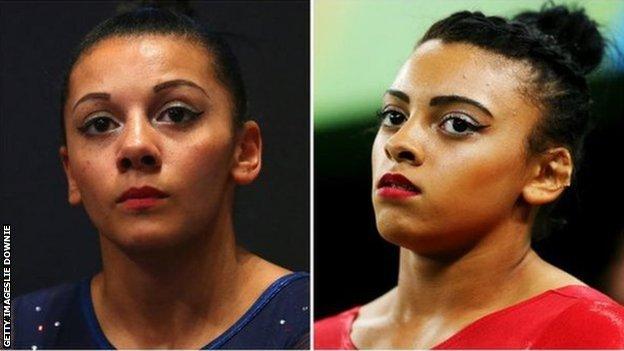Gymnastics: Helpline set up for abused athletes

Last updated on .From the section Gymnastics

A confidential helpline is being set up for British gymnasts who say they have suffered bullying or abuse.
The service, run jointly by the British Athletes Commission (BAC) and the NSPCC, comes amid widespread allegations in the sport.
Several gymnasts have come forward detailing their experiences of mistreatment in recent days.
The dedicated helpline will be "a safe place for athletes to go to" BAC board member Peter Crowther told BBC Sport.
"We will then get each of these athletes the respective support they need."
"It will be staffed by appropriately-qualified personnel, and will deal with all queries as they come in. We have already had inquiries.
"It was gut-wrenching to see these utterly disgraceful allegations be made public and concerning not just athletes, but young children."
"This is likely to be one of the more in-depth and broad-ranging situations we've faced, but unfortunately we've dealt with many situations of alleged abuse… across many sports."
Last week, British Gymnastics announced an independent review after Olympians Becky and Ellie Downie claimed abusive behaviour in gymnastics became "completely normalised" and several athletes told the BBC of a "culture of fear" in the sport.
Chief executive Jane Allen vowed the governing body would "not seek to influence" the process, and said she was "ashamed and appalled" by the allegations.
But Crowther says the BAC should help decide the terms of reference for the panel that leads the inquiry.
"It is understandable that the British Gymnastics wants to have an independent investigation and that's completely understandable… when something as serious as this emerges" he said.
"[But] frankly, it's not in the interest of anyone, including British Gymnastics, to commission a report where they set the terms of the investigation and tell the investigating panel what sort of questions to ask.
"It doesn't inspire confidence - athletes need to go somewhere they feel completely safe…if I was British Gymnastics I would be urging a report that was prepared by an independently-decided body convened with questions and terms of reference that they decide are appropriate for this issue.
"I can't think of anyone better placed than the BAC to do this. We need to get the facts."
On Wednesday, Olympic medallist Beth Tweddle said "there is no place for bullying or abuse in the sport that I love" and urged all gymnasts to share their feelings.
In a post on Instagram, Tweddle, who won bronze on the uneven bars at London 2012, said: "Gymnastics is my life, and it's been a difficult week or so for everyone in gymnastics reading and watching the stories in the news.
"You should never be afraid to talk and it hurts me to learn that gymnasts have not felt like they can do this. Sharing feelings, talking about experiences and being open is, I believe, the only way to create a positive and healthy environment."
Meanwhile International Olympic Committee (IOC) President Thomas Bach said the organisation takes the allegations of emotional and physical abuse in British gymnastics "very, very seriously"
"These cases are clearly against everything we stand for and therefore we will do everything we can with regard to prevention" he said.
"But also to then follow up on cases if they should come under our jurisdiction"
British Gymnastics is the latest governing body to be engulfed in an athlete welfare crisis since Rio 2016, and Crowther said the development shows "more effort needs to be put into policing the high-performance system."
Crowther said the funding the BAC received from funding agency UK Sport was "deeply insufficient".
In 2018, UK Sport announced a range of new initiatives to improve athlete welfare, upping investment for the BAC to £1m for the rest of the Tokyo 2020 cycle which it said would generate "a three-fold increase in its capacity to support its members."


















